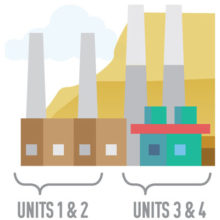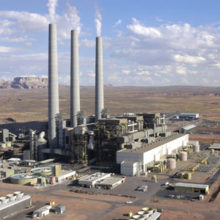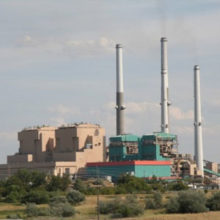The policies, processes, and politics around Colstrip’s coal-fired power plant in eastern Montana are ever-changing.
To help officials, citizens, media, and students better understand the context of Colstrip-related decisions, Resources & Communities Research Group at Montana State University and Headwaters Economics have released “Colstrip: The Status of Key Policies and Decision Processes.”
The report attempts to provide an unbiased and accessible overview of the policies and processes that shape planning for the long-term social, economic and environmental well-being of the community of Colstrip, Montana.
 Colstrip-related events are unfolding at a fast pace. In late July, news reports stated that Montana did not testify in Puget Sound Energy’s (PSE) ongoing rate case in Washington State where Colstrip closing costs and community assistance plans are being discussed.
Colstrip-related events are unfolding at a fast pace. In late July, news reports stated that Montana did not testify in Puget Sound Energy’s (PSE) ongoing rate case in Washington State where Colstrip closing costs and community assistance plans are being discussed.
By early August, Talen Energy is required to submit a closure plan to the Montana Department of Environmental Quality detailing the actions necessary and funding required to shutter Units 1 and 2. The closure plan will begin to reveal the actual costs of closure, and what costs may not be covered.
Colstrip’s Coal-Fired Power Plant and Community
No policy or framework governs the multiple aspects of coal-fired power plant closures, including decommissioning, site remediation, worker assistance, and community economic transition. As a result, plant closures become ad-hoc political, legal, and community efforts.
Funding and planning for community impacts and economic transition will come (if and when it does) from diverse sources pursued through local and state leadership. The Colstrip Status report points to three important policies and processes that provide perhaps the best opportunities to address economic transition goals and actions:
• As noted above, by early August Talen Energy is required under the Administrative Order of Consent (AOC) to submit a closure plan for Units 1 and 2 to the Montana Department of Environmental Quality (DEQ). This plan will coordinate actions between Talen and DEQ, including a recommendation for additional bonding to cover closure costs. The public will learn more about proposed actions and costs related to closing Units 1 and 2.
• The Coal-Fired Generating Unit Remediation Act passed by the Montana Legislature in 2017 (SB 339) requires submission, review, and approval of a remediation plan by the owner of a coal-fired generating unit to DEQ within 90 days of (and no earlier than five years prior to) plant retirement.
The Act expands the scope of what is required in a closure plan beyond the limited scope of the AOC that is limited to groundwater contamination associated with the settlement ponds. The new law will provide the state (and the public) with an important opportunity to clarify what plant closure entails and seek additional actions from the plant owners.
• A 2017 economic diversification plan initiated by the regional economic development corporation sets out several strategies to capture opportunities related to repurposing and leveraging industrial and energy facilities and diversifying economic opportunities. The strategy is the first step toward building partnerships, seeking funding, and taking actions that will replace lost jobs and revenue when Units 1 and 2 close.
Research for this report is part of a larger West-wide overview existing and proposed economic transition plans for communities where coal-fired power plants are closing and where coal mines are experiencing reduced demand.



